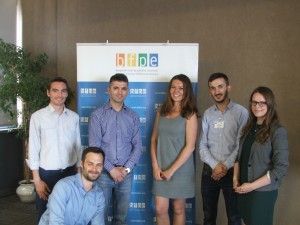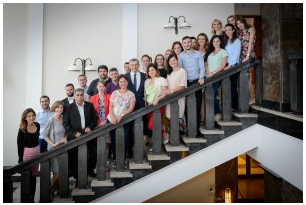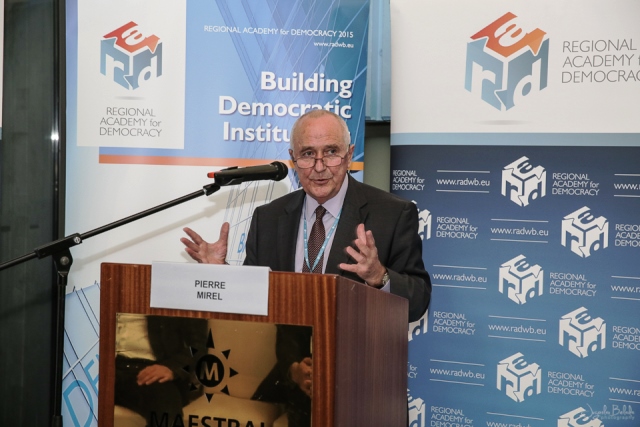Regional Projects
Regional Seminars
In recent years, as the Network of Schools has gradually expanded, several Schools have begun to cooperate between themselves to offer regional seminars. Some examples of recent regional projects include the South Mediterranean, the Western Balkans Anti-Corruption Forum and the Regional Academy for Democracy.
Regional Seminars in the South Mediterranean (2013-2018)
In November 2013, the Schools of Political Studies of Tunisia and Morocco joined forces to develop the regional dimension of the Schools in the South Mediterranean. By bringing together participants from the two Schools as well as numerous representatives from different countries of the Mediterranean region, notably Egypt, Algeria, Libya, Mauritania and Yemen, the two regional seminars have become an annual platform for exchanges and debates between civil society activists, academics, and experts in the fields of political science and human rights on key challenges to the consolidation of democratic processes in the region.
Five regional seminars have been organised so far:
November 2013 in Tunis: “Understanding the Arab Spring and its impact.”
November 2014 in Marrakesh: “Standards and tools to institutionalise policies of diversity in the Southern Mediterranean: for a negotiated transition towards democratic pluralism and human rights strengthening in the countries of the region.”
November 2015 in Hammamet: “The future of local participatory democracy”
November 2016 in Marrakesh: “Democracy and climate change: Possible South-South and North-South partnerships to stabilise transition in the South-Mediterranean”
October 2017 in Hammamet: "Migration in the Euro-Med region"
The Summer Academy for Strengthening Democracy in the Euro-Med Region (2014-2017)
 The Summer Academy for Strengthening Democracy in the Euro-Med Region is an initiative of the Bulgarian School of Politics “Dimitry Panitza” and was organised in cooperation with the Tunisian School of Politics and the Citizenship School of Political Studies in Morocco. The main goal of the Summer Academy is to reinforce democratic reforms and the establishment of democratic governance in the Southern Mediterranean, through exchange and cooperation between participants active in the political life of the countries in the region and the EU. The Summer Academy brings around the same table prominent young leaders, aged 25-40, from Morocco, Tunisia, Egypt, Lebanon, Jordan and Bulgaria. It aims to promote constructive cross-border dialogue and to establish transnational networks among practitioners of democracy, activists, representatives of political parties and civil society organisations from the Middle East, North Africa and Europe.
The Summer Academy for Strengthening Democracy in the Euro-Med Region is an initiative of the Bulgarian School of Politics “Dimitry Panitza” and was organised in cooperation with the Tunisian School of Politics and the Citizenship School of Political Studies in Morocco. The main goal of the Summer Academy is to reinforce democratic reforms and the establishment of democratic governance in the Southern Mediterranean, through exchange and cooperation between participants active in the political life of the countries in the region and the EU. The Summer Academy brings around the same table prominent young leaders, aged 25-40, from Morocco, Tunisia, Egypt, Lebanon, Jordan and Bulgaria. It aims to promote constructive cross-border dialogue and to establish transnational networks among practitioners of democracy, activists, representatives of political parties and civil society organisations from the Middle East, North Africa and Europe.
Four Summer Academies have been organised so far:
Summer Academy 2017: “Violent Radicalisation and Extremism in the Euro-Med Region and the Role of Civil Society in Developing Successful Countering Strategies”
Summer Academy 2016: “Democracy and Education”
Summer Academy 2015: “Security and Culture”
Summer Academy 2014: “Summer Academy for Building Democracy through Cultural Diplomacy”Summer Academy for Building Democracy through Cultural Diplomacy” (in Bulgarian)
Western Balkans Anti-Corruption Forum (2016)
The Visegrád School of Political Studies in partnership with the Schools of Political Studies in the Western Balkans launched an initiative entitled “Western Balkans Anti -Corruption Forum”. The objective of this regional programme was to identify the gaps in combating corruption in the Western Balkans, to share the V4 experiences in the field, and to equip participants with the skills and knowledge required to improve anticorruption measures in their countries.
The Forum programme was structured in three parts:
June 2016 in Belgrade: Workshop on improving anticorruption measures, raising social awareness and improving skills essential to combating corruption among young leaders
July 2016 in Warsaw: Study visit to major Polish anti‐corruption institutions with the aim of learning from Poland’s successful experiences in combating corruption during the post-transition period
September - December 2016: Series of town hall meetings in six Western Balkan countries presenting and promoting the project
Regional Academy for Democracy (2013-2015)
 The Regional Academy for Democracy (RAD) was an initiative of the Western Balkan part of the Network of Schools of Political Studies of the Council of Europe, supported by the European Commission. It aimed to build a new political culture and new political elite in the region.
The Regional Academy for Democracy (RAD) was an initiative of the Western Balkan part of the Network of Schools of Political Studies of the Council of Europe, supported by the European Commission. It aimed to build a new political culture and new political elite in the region.
Structured in three yearly cycles, the RAD gathered around 150 political leaders from Albania, Bosnia-Herzegovina, Croatia, Kosovo*, Macedonia, Montenegro, and Serbia (7 per country per year) in a joint experience of extensive learning and exchange.
Each year, RAD organised four highly interactive seminars and one study visit for the same group of 50 participants engaged in the topic of the year: Justice and Security Cooperation (Year 1), Human and Minority Rights (Year 2), and Building Democratic Institutions (Year 3).
The participants were selected from among leading young politicians who already held significant posts either on the state level or in their respective political parties, such as Secretaries of State, Deputy and Assistant Ministers, Members of Parliaments, leading party officials, diplomats, as well as a number of the most outstanding mayors and regional leaders.






